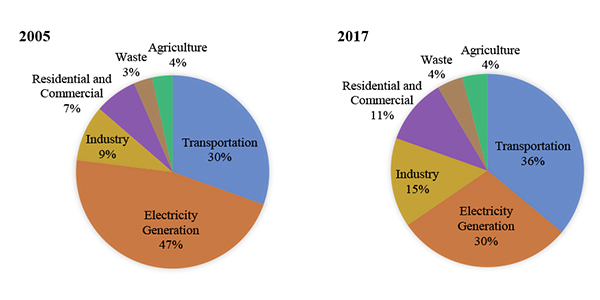A Nevada state agency is seeking approval by year-end for a program to tighten vehicle emission standards and increase availability of electric cars, bringing the state’s regulations in line with those of California.
The program, Clean Cars Nevada, was announced by Gov. Steve Sisolak in June. The Nevada Division of Environmental Protection (NDEP) has released draft regulations that would implement the program, with a goal of receiving approval from the State Environmental Commission by December.
If all goes as planned, the program will take effect for model year 2025 vehicles.
LEV and ZEV
Clean Cars Nevada has two components: the low-emissions vehicle (LEV) and zero-emissions vehicle (ZEV) programs.

Nevada’s transportation sector has grown to account for the largest share of the state’s GHG emissions with the reduction of electricity generation emissions. | Nevada Division of Environmental Protection
The LEV program would apply California’s emission standards for greenhouse gases and other pollutants to cars for sale or for lease in Nevada. Those would include passenger cars, light-duty trucks and medium-duty vehicles.
Under the federal Clean Air Act, federal standards apply to tailpipe emissions unless a state decides to implement California’s more stringent emission standards, which 13 other states have adopted. Nevada, Minnesota and New Mexico are in the process of evaluating or adopting the California standards.
Under the ZEV program, Nevada would require automakers to sell an increasing percentage of zero emission vehicles. The program uses a system of credits that are awarded based on the type of zero-emission vehicle sold and the vehicle’s range.
Ten states in addition to California have adopted the ZEV program.
However, Clean Cars Nevada faces a potential roadblock. The Trump administration in September 2019 revoked California’s waiver allowing the state to implement its own emission standards and ZEV program.
The rule revoking the waiver has been challenged in court. It’s also possible that the Biden administration will reverse it.
For now, NDEP’s authorization to implement Clean Cars Nevada states that the regulation will take effect only if the California waiver is reinstated or a new waiver is issued.
Support, Opposition
Clean Cars Nevada has the support of more than 70 organizations, including environmental, business and public health groups that have joined to form the Nevada Clean Cars Coalition, according to the National Resources Defense Council.
Travis Madsen, transportation program director with the Southwest Energy Efficiency Project, said electric vehicles are almost three times as efficient as their gas-powered counterparts.
“That translates into major benefits, including saving consumers money, improving public health and reducing climate-changing pollution,” Madsen said during a public listening session that NDEP hosted in January.
But Madsen had concerns about a provision in the proposed regulation that would award ZEV credits to automakers based on their balance in California’s credit bank. That would in effect give automakers a pass for several years of the Nevada program, Madsen said. Instead, he’d like to see the state focus on awarding ZEV credits to automakers who act early to increase the availability of electric cars.
Andrew MacKay, executive director of the Nevada Franchised Auto Dealers Association (NFADA), said regulation of fuel economy and emissions should be left to the federal government to provide more regulatory certainty. NFADA opposes Clean Cars Nevada.
MacKay said the affordability of new vehicles to consumers should also be considered.
“If we lose affordability, we will lose vehicle sales,” MacKay said during the NDEP listening session. “And if we lose sales, all that we will do is keep older, less safe, less fuel-efficient vehicles on the road, potentially shifting our environmental goals into neutral or reverse.”
Next Steps
NDEP hosted a webinar introducing Clean Cars Nevada in December, followed by the listening session in January. Last month, the agency held a technical session to discuss the LEV program.
The next steps are a technical session on the ZEV program on March 30, from 9-11 a.m., and a technical session on the ZEV credit bank sometime in April.
NDEP will analyze the impacts of the program on air quality and small businesses and post the findings on the program’s website.
NDEP expects to revise the proposed regulations based on feedback. That will be followed by a public workshop in June. The regulation is tentatively scheduled for a State Environmental Commission hearing in September.
The Nevada Department of Motor Vehicles will also review the proposal.
Meeting GHG Goals
Clean Cars Nevada is intended to help the state meet greenhouse gas reduction goals set by Senate Bill 254, which was signed into law in 2019. The state aims to reduce GHGs to 28% below 2005 levels by 2025, 45% below by 2030, and achieve zero or near-zero emissions by 2050.
NDEP projections show the state falling short of meeting those targets, with a 24% reduction in greenhouse gases by 2025 and a 27% reduction by 2030.
The transportation sector has been the biggest contributor to GHG emissions in the state since overtaking the electricity generation sector in 2015, according to the agency’s most recent greenhouse gas inventory. As of 2017, the transportation sector accounted for 36% of the state’s GHG emissions, followed by electricity generation at 30% and industry at 15%.
When broken down by fuel type, gasoline accounted for 59% of Nevada’s GHG emissions from transportation in 2017, followed by diesel at 23% and aviation fuels at 16%.




